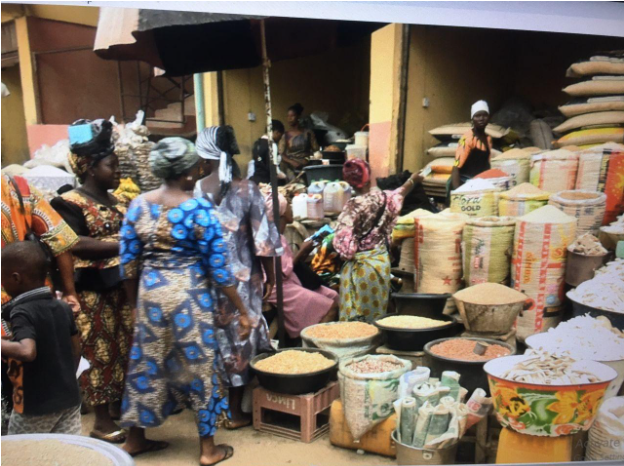Game of Loans: How Female Entrepreneurs in Gbagi Market Are Navigating Financial Tightrope

|
Getting your Trinity Audio player ready...
|
In the heart of Ibadan, Nigeria’s third-largest city, lies the renowned Gbagi Market, one of West Africa’s largest textile hubs and a place where colours, commerce, and culture merge. The air pulses with movement: traders calling out to customers, the scent of fresh fabrics rising in the midday heat, bolts of lace, Ankara, and Aso-Oke stacked in towering rolls.
But beyond the visible bustle is a quieter story, one of survival, strategy, and sacrifice. This is where generations of women have built livelihoods not just with goods, but with grit.
One such woman is Deaconess Kehinde Omowamiwa Oloko, a seasoned textile distributor who has spent more than five decades in the trade. Her family’s legacy in the fabric business spans four generations. She reflects on her journey with a wisdom that comes only from years of enduring economic storms and personal triumphs.
“I started this business when I was just 13 years old,” she recounts from her store, her face fixated on customers checking out folded materials imported from Asia. “This trade has been passed down from my grandmother to my mother and then to me. I’ve seen it all,” she added.
She speaks of a time when international trade was more stable, when foreign suppliers trusted Nigerian traders with flexible payment systems.
“Before the dollar became expensive and unpredictable, we used to deal with what we called part-payment. We gave our foreign suppliers, mostly Europeans or Asians, 30% upfront. When the goods landed, we paid the remaining 70%.”
Surviving the economy
But the volatility of Nigeria’s foreign exchange market has made that model untenable. She describes a defining moment that threatened the survival of her business.
“There was a year when I ordered clothes when the dollar was ₦145. Before the shipment arrived, it had risen to ₦400. Imagine the difference.
“I had already collected deposits from other traders and distributors who trusted me. The goods arrived, and we sold at a terrible loss. It was so bad that the market heads had to step in and mediate. If those weren’t collective goods, I would have suffered an unbearable loss alone.”
Her voice softens, but the weight of experience sharpens her tone. “That’s the risk with part payment. It can ruin you overnight.”
The Game of Loans
For Deaconess Oloko, the answer to sustaining a trading business in Nigeria’s turbulent economy lies in community-based financial systems, not traditional banking. Over the years, she has embraced cooperatives, informal thrift groups known as Ajo, and occasionally microfinance institutions.
“I once joined a cooperative in Bodija,” she says. “It was structured in a way that if you had ₦1 million, they could lend you ₦3 million. That was the arrangement. And they were reliable. As long as you had a credible guarantor and a clean record of repayment, they would support you when you needed to roll over or increase your funding. That’s how many of us kept growing.”
She is adamant that access to credit is not optional for market women.
“There is no serious market trader who doesn’t borrow money,” she declares. “Only those who are not interested in growing their businesses avoid loans. We all do it from cooperatives to ajo to microfinance banks.”
But the lending landscape has changed drastically.
“I started borrowing money over 25 years ago, when interest rates were at 17%. Back then, we could manage. We used to plan our borrowing carefully, usually when production was almost complete, so we could turn around and pay back before the due date. But now? Interest rates are at 22%. There’s no profit left once you repay the bank.”
She no longer goes near commercial banks. “The risks are too high, and there is nothing to gain.”
More heartfelt stories
In another corner of Gbagi Market, mid-30s Tolani Adigun, popularly known as Tolani Omooloko, continues the family legacy as the fifth-generation leader of their textile enterprise. Dressed in a vibrant yellow blouse, she moves between stacks of lace, taking calls and negotiating prices. Yet, beneath the confident business persona is a woman who has had to learn hard financial lessons early.
“We source most of our materials from outside the country,” she explains. “That means we are constantly at the mercy of exchange rates and import delays. I’ve taken loans from commercial banks and microfinance banks. The rates are always ridiculously high. Then there are the bottlenecks: getting a guarantor, waiting for evaluation, all that paperwork. Most women in the market can’t meet those requirements.”
The stigma associated with borrowing is another burden she bears.
“Even when you’re managing your business responsibly, the moment people find out you took a bank loan, they start talking. There’s gossip. People look down on you. They say, ‘She’s using loan money to run her business.’ It becomes a thing of shame.”
Tolani chooses traditional systems over formal ones.
“I run three different ‘ajo’ groups. My mother runs six. It’s the most stable option we have. You don’t pay interest. The only risk is when someone runs away with the money, but we’ve built trust. We take ₦5 million, ₦10 million through this method.”
She’s only used bank loans twice since taking over the business, both times with delays that nearly made the funds useless. “By the time the loan is approved, two or three months later, the market has shifted. The season is over. The money doesn’t meet the need anymore.”
According to the Global Entrepreneurship Monitor, Nigeria has one of the world’s highest rates of women entrepreneurship, with 41% of women engaged in entrepreneurial activity. Yet, only 15% of women have access to formal credit, compared to 27% of men. The International Finance Corporation (IFC) reports a $1.5 billion credit gap facing women-owned businesses in Nigeria.
Despite these barriers, Nigerian women have some of the highest loan repayment rates in Africa, a fact echoed by women in Gbagi Market.
Mrs. Folake Olayinka, a foodstuff trader in the textile market, shares her story with a quiet sense of pride. “I joined a cooperative and collected ₦400,000. I used it for ten months and made about ₦100,000 profit. I used my friend as my guarantor. After I paid it back in full, they gave me a bigger loan.”
Her story reflects a common strategy using cooperative funds to boost business capital, purchase inventory, or meet personal needs while ensuring timely repayment.
Then there’s Ms. Monsurat Olaniran, founder of Aseyori CICS Cooperative, who began with nothing but ambition and a small network of trustworthy women.
“We started with 10 members. These were women I knew personally, honest and hardworking. Eventually, we grew to 25. We helped each other.
“But over time, some people stopped paying back. Now we are down to six members. Still, we’ve loaned as much as ₦1 million to individuals. It has helped us stay in business when there were no other options.”
Gbagi’s women traders want not handouts but access to fair, flexible, and timely credit facilities that align with the seasonal nature of their trade. Several called for support from Nigeria’s Bank of Industry and better-designed government intervention schemes.
“We need the Bank of Industry to come closer to the markets,” Tolani urges. “They need to simplify the process. Right now, you go through property evaluations, wait months for approval, and in the end, the money doesn’t even solve your problem.”
At this point, experts agree that what these women are experiencing reflects a broader national trend.
Expert speaks: Way forward
Dr. Mojeed Kolawole Lawal, Dean of the Faculty of Financial Management Studies at The Polytechnic Ibadan, argues that empowering women in the informal sector is critical for national growth.
“Women in the informal sector play a vital role in grassroots economic activities. When given financial support, they contribute to entrepreneurship, create jobs, reduce income inequality, and help build assets,” Dr. Lawal stated.
He highlighted key challenges: “High interest rates, short repayment periods, lack of collateral, low financial literacy, and unethical practices by bank officials all prevent women from accessing loans. Without addressing these issues, national development will suffer.”
He proposed reforms such as simplified loan processes, flexible repayment structures, and gender-based lending targets.
“Commercial banks should allocate at least 30% of their lending to women. The Central Bank should reserve 50% of intervention funds for women entrepreneurs. These women are diligent, trustworthy, and underutilised.”
His call reinforces what many in Gbagi already know: access to credit isn’t a luxury, it’s survival.




